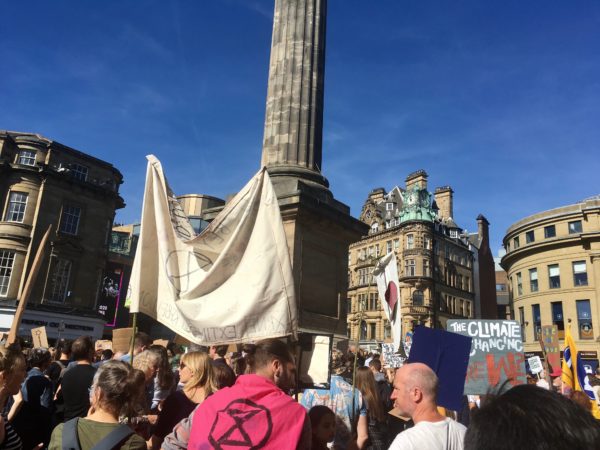
From making costumes to marching: How to help the environment as a student
Together, with small actions and wider system change, we can make a difference.
Our generation is potentially the most engaged in the climate movement, and likely to have the highest levels of eco-anxiety. We know that climate change is scary, real and needs to be taken seriously – but that doesn’t mean that it isn’t overwhelming. In Newcastle and across the North East, there’s a lot going on to help tackle this issue, and this year Newcastle Uni was ranked 11th worldwide for work towards the UN’s Sustainable Development Goals. But what can we as students do to tackle the climate crisis? Here are a few tips that can help Newcastle students be more sustainable while at Uni:
Bring your own lunch to Uni
It’s easy to forget to bring a homemade lunch or be too lazy to prepare it, and instead opting for something quick and easy from Co-op, Gregg’s or Shijo – but in terms of the waste that can rack up (not to mention the cost) it means a lot of plastic. Now that we’re spending less time at Uni and these options may be less tempting it’s important to remember not to slip back into old habits as we prepare to head back to Newcastle and slip into our previous routines.
There are microwaves all across campus, mostly likely found in common rooms and in other communal working spaces (e.g. at the Marj or the SU), which I have found incredibly useful for my lunches. I’ll pack a portion of whatever meal I made most recently into whatever container I have available (using old takeaway tubs works brilliantly and is a great way to reduce waste), and I’m ready to go! These meals will likely be more nutritious, save on both money and packaging, and you can make them a lot more interesting than pre-packaged ones too. And make sure to bring some cutlery in with you too. Buying a bamboo set is really not necessary, even if many ‘zero waste’ influencers may make you feel like it is. Just use a knife and fork you already own.
While you’re at it, you can make these meals meat-free! Animal agriculture is one of the biggest factors in climate change, so any meal with less meat (or other animal products) go a long way. You don’t need to become veggie or vegan overnight (that strategy never works properly anyway), but consider trying one meatless day a week and swapping dairy milk for a plant-based one.
If hot lunches aren’t something you’re fond of, make yourself a sandwich, a salad or something else! There are plenty of options, and you can do whatever it is that works best for you.
Join climate protests
Ultimately, individual action will not stop climate change. You may have noticed the regular crowds with placards meeting outside the Civic Centre, then making their way to Monument. While these aren’t all climate related protests, many of them are, and we should do our best to join in and support those as much as possible (and as long as it is safe to do so).
Help make these bigger, go along with a group of friends, share it on social media (maybe tag a few oil billionaires while you’re at it). Help ensure these protests are noticed and talked about. Actions like these are one of the only ways we can catch the attention of people who actually have the power to make real differences to the climate crisis. It is people in power (both in terms of political power and financial) who need to act on this. Like everything, the climate crisis intersects with so many issues in so many different ways – patriarchy, capitalism, white supremacy, colonalism… the list could go on for ages. That means that many people don’t have the privilege of being able to make sustainable choices, while it is those with that privilege who often ignore the calls to help. We must keep making noise until those people listen and take note.
Keep an eye out for marches in your area, or even help organize one! Climate protests aren’t just those started by Greta Thunberg or run by Extinction Rebellion. Smaller, more local groups also exist (such as Climate Action North East) and it’s worth checking them out.

Make a Halloween costume from what you already own!
Newcastle students have tonnes of dress up parties, with many a ‘uni packing list’ including a costume or two. So, this is definitely not limited at Halloween, it is nevertheless the most prominent night for costume-wearing party-goers.
Although Halloween won’t be happening the same way this year, that doesn’t mean you can’t dress up and have some fun anyway… and if you’re not in your final year, you still have more Halloweens left to celebrate at Uni!
Every year, we have the pressure of coming up with new outfits, so much so that they become disposable in our social conscious. This is an outfit you wear once and only once. It was estimated that 7 million costumes went to landfill in the UK in 2019. With 83% of Halloween costume material being made from plastic, this is devastating for the environment before we even think about the history of these garments – the sustainability and ethics of their production, their shipping halfway across the world… The disposable culture around clothes in general needs to change, but Halloween is a particularly prominent offender for demonstrating the fast nature of the modern fashion industry.
For me, Halloween costumes (or any kind of dressing up) is more fun than pressure. It’s a chance to look through my wardrobe and create something new from old clothes. Last year I went as ‘Zombie Minnie Mouse’, using an outfit I’d worn as a Disney Bound the summer before (including Minnie Mouse ears I’ve had since I went to Disneyland when I was three #reuse and #recycle) along with some dark makeup. The year before, I wore a black dress with a pair of cat ears I’d bought and used the year before that (I know, how cliché). Use what you have and be creative, there are more possibilities than you’d think.

Join a society which aims to have a reduced impact on the environment
Societies are something I would encourage every student to get involved in. They’re a great way to make friends, have fun, but also do something meaningful and help make real change. Many societies aim to have a positive impact on their university, from liberation societies, such as Feminist Society and LGBT+, to sports/activity societies fundraising for the community, and environmental societies are included in that. These societies can be super educational, as well as help you find more ways to further your environmental activism and get to know people who are really passionate about this issue and know what they’re talking about too!
If you have the funds, but aren’t able to commit to giving a lot of your time to that society, buy a membership at the start of the year. This goes a long way, especially as a means of ensuring these societies are able to carry out their larger campaigns, which include lobbying universities to divest from oil companies with campaigns such as Fossil Free.
At Newcastle, these include People & Planet and Extinction Rebellion.
Have your library coffee in a reusable cup
If you’re spending hours on end in the Robbo writing essays or doing your dissertation (or whatever it is STEM students do), it’s likely that you rely on caffeine (or another kind of hot drink) to help you get through… I know that I do.
However, plastic disposable cups (even if compostable, biodegradable, and all those other environmental buzz-words) are incredibly damaging. We know that, we’re told it all the time. But that doesn’t make it any less true. Almost half of all hot drinks in the UK are sold in disposable cups. That means that 2.5 billion are used and thrown away each year – enough to circle the world 5 times! Making the switch to a reusable cup will reduce your personal impact massively.
Plus, you get a discount if you use a reusable cup! At Newcastle Uni cafes, you get 20p off! You can also get money off in high street coffee shop chains, including 50p at Pret, 25p at Costa and double loyalty stamps at Caffe Nero.

There is no one way to tackle the climate crisis, but there is something everyone can do. As mentioned before, we need to remember that while individual action is important and definitely does have an impact, it is a group effort. We also need to ensure that we’re holding the people in power accountable, both in Newcastle and across the globe. Together, with small actions and wider system change, we can make a difference.









































